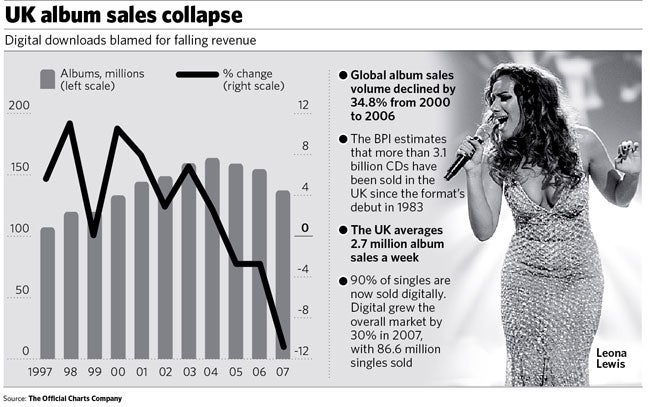Slump in album sales could see end of CD

The record industry suffered a double whammy at the beginning of 2008, as album sales were hit by a catastrophic decline, according to new figures, and experts predicted that plans to legalise the copying of music between formats could soon render the CD redundant.
The BPI, which represents the UK music industry, has revealed that sales of albums had plunged by a remarkable 10.8 per cent in 2007. When compilations and soundtracks were stripped out of the figures the fall was an even more dramatic 14.3 per cent on the previous year, which in turn was nearly 3 per cent down on 2005 sales.
Despite the success of home-grown acts such as Amy Winehouse and Leona Lewis, whose albums Back to Black and Spirit shifted four million albums between them, 2007 was far from a vintage year for new releases with 16 million fewer albums sold than in 2006. Figures were boosted however by the appeal of compilations such as the Now That's What I Call Music which reached 68 in the series this year and the two High School Musical soundtrack albums.
The BPI said album sales were still well above 1990s levels and that singles, fuelled by the soaring growth in downloads, enjoyed the third biggest year on record. But the popularity of digital music was blamed for hurting the performance of albums as many fans now prefer to download individual tracks, often recommended by reviewers, rather than investing in the whole thing.
Copyright theft and deteriorating retail conditions were also blamed for the fall. However, some commentators pointed to an overall decline in the number and quality of this year's big releases. Paul Rees, editor of Q magazine, said: "It would be hard to think of a real classic this year by a major artist other than Amy Winehouse. When you look at the state of the album charts, much of it is piffle, this is traditionally the time when you get some sort of backlash movement launched.
"If it is still the same at the end of next year then we should all be worried."
The industry is now pinning its future on its ability to generate new talent and new formats, particularly online and on mobile phones. The BPI chief executive, Geoff Taylor, said: "The UK market remains a strong performer internationally and the pace of growth in digital sales is encouraging. Music in all its forms is more popular than ever and the recorded music sector will reap the benefits as the online market matures."
Yesterday, Lord Triesman, the minister for Intellectual Property, alarmed the industry when he proposed changes to copyright laws to allow consumers to move their music legally from CDs to MP3 players. Though technically illegal, the practice is virtually universal among music fans, many of whom have spent hundreds of hours transferring record collections to their computers and iPods.
Alison Wenham, chief executive of the Association of Independent Music, warned the Government not to mess with the current law. "This will be widely assumed to be a green light on the right to copy," she said. "There is a huge danger this will lead to uncontrollable file sharing. It is hard to put a definite date on it but we are not talking here about the survival of the CD format."
Join our commenting forum
Join thought-provoking conversations, follow other Independent readers and see their replies
Comments
Bookmark popover
Removed from bookmarks